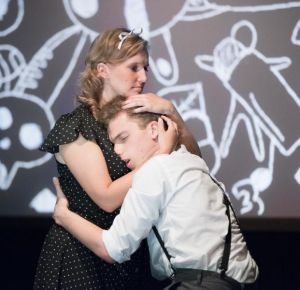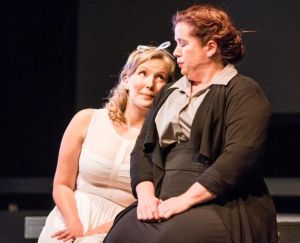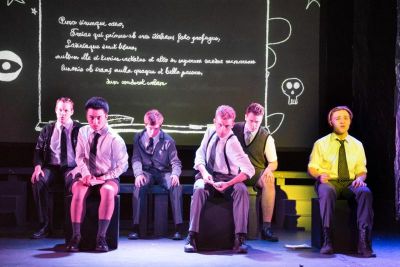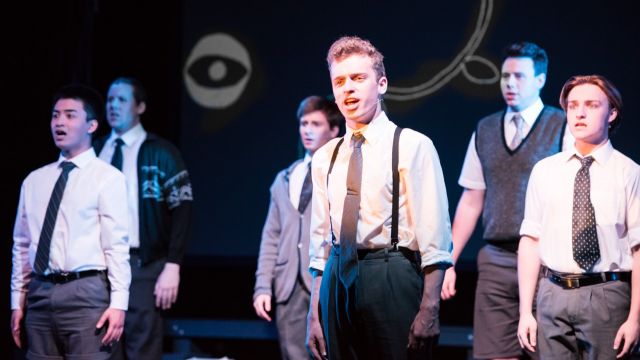Spring Awakening
Looking back over their incredible 45-year history of putting on shows in South Australia (which is detailed in an exhaustive list at the back of the program for their latest production), one thing that the Hills Musical Company deserves to be praised for is their willingness to take risks in choosing material. Over the last five years alone, for every beloved old favourite (such as A Little Night Music) or commercial crowd pleaser (Legally Blonde), they have taken a chance in championing shows that are more obscure (The Drowsy Chaperone) or confronting (Kiss Of The Spider Woman). What is more remarkable than this is that the less famous and more challenging shows have been brought to the stage with the same degree of loving care and professionalism as the obvious “sure-fire hits”, making a strong case that these musicals are worthy of attention from both a general audience and hardcore theatre-buffs.
 Their latest effort, Spring Awakening, is no exception. It is a controversial work that has tended to provoke very strong “love it or hate it” reactions ever since it premiered on Broadway in 2006. This revival presents the musical in a manner that is accessible and bracingly relevant to a contemporary audience, but without dumbing down the source material in any way. Indeed, the dynamic energy and inventive visuals of this incarnation do serve to soften some of the flaws present in the writing, so there is a chance that those who were left cold by previous stagings, or by the incomplete cast recording, might be swayed to see Spring Awakening in a new light. But perhaps the most pleasant surprise of all is that this revival serves not only as a platform for showcasing some of the finest voices ever to emerge from youth theatre in South Australia, it also allows a couple of established theatre veterans to reveal some astonishing hidden depths.
Their latest effort, Spring Awakening, is no exception. It is a controversial work that has tended to provoke very strong “love it or hate it” reactions ever since it premiered on Broadway in 2006. This revival presents the musical in a manner that is accessible and bracingly relevant to a contemporary audience, but without dumbing down the source material in any way. Indeed, the dynamic energy and inventive visuals of this incarnation do serve to soften some of the flaws present in the writing, so there is a chance that those who were left cold by previous stagings, or by the incomplete cast recording, might be swayed to see Spring Awakening in a new light. But perhaps the most pleasant surprise of all is that this revival serves not only as a platform for showcasing some of the finest voices ever to emerge from youth theatre in South Australia, it also allows a couple of established theatre veterans to reveal some astonishing hidden depths.
Based upon a 19th century German play, Spring Awakening focuses on a group of teenagers struggling to cope with the onset of puberty, the sometimes viciously competitive social norms of high school, as well as the increased academic demands and social responsibilities placed upon them by (often negligent or abusive) adults. Despite the source material’s antiquity, Spring Awakening never once feels like a period piece. The emotional arc of these characters, the dramatic obstacles placed in their path, these exact same things are still relevant to any teenager sent to a private school today, especially one with a conservative religious bent. This is reinforced in a chillingly effective way by director Hayley Horton’s decision to incorporate video montages compiled by Sam Davy, which edit together contemporary news footage and excerpts from an “abstinence is the best policy” sex-ed film. In this context, Duncan Sheik’s stridently catchy rock score never comes across as anachronistic, and neither do Steven Sater’s brashly modern lyrics, which casually include everyday swear-words. The songs are given a punchy workout by musical director Mark Delaine, that is well matched with the frantic urgency of Thomas Phillips’ choreography.
 Given that this is a show that handles such heavy issues as teen-pregnancy, abortion and suicide, many casual theatregoers might be wary of going near it, for fear that they’d be in for a non-stop pile-up of angst and misery. It must be emphasised that this is simply NOT the case. There are many moments of humour scattered throughout the show, and poignant scenes of genuinely warm intimacy between characters. Horton strikes a good balance in her direction, ensuring that these moments of light have just as much weight as the moments of darkness, which are handled with a commendable sensitivity.
Given that this is a show that handles such heavy issues as teen-pregnancy, abortion and suicide, many casual theatregoers might be wary of going near it, for fear that they’d be in for a non-stop pile-up of angst and misery. It must be emphasised that this is simply NOT the case. There are many moments of humour scattered throughout the show, and poignant scenes of genuinely warm intimacy between characters. Horton strikes a good balance in her direction, ensuring that these moments of light have just as much weight as the moments of darkness, which are handled with a commendable sensitivity.
The leads succeed in bringing a measure of complexity to characters that could easily have slipped into caricature. Mitchell Smith, as disaffected intellectual Melchior, retains a sense of boyish vulnerability, never letting the audience forget the youthful insecurity that underlies much of his hipster posturing. Millicent Sarre plays Wendla, a sheltered teen whose overprotective mother has kept her ignorant about sex and human relationships. Sarre understands that there is a difference between being naïve and being stupid; she plays Wendla with a quiet strength and intuitive emotional intelligence, despite her ignorance of the birds and bees. It is a performance of great dignity, in a role that a lesser actress might play as a ditzy bimbo. Connor Olsson-Jones, Jemma Allen and Sahra Cresshull play the children of abusive parents with a raw charisma that ensures the characters register as more than mere “victims”. Zac Moore & Harry Nguyen play a gay couple without any affected camp mannerisms and their relationship is heartwarming without resorting to manipulative sentimentality.
 The rest of the ensemble bring finely honed technical finesse to their singing and dancing, alongside impeccable comic timing, and nuanced dramatic acting. That said, the two adult cast members, Josh Barkley and Kate Anolak, deserve to be singled out for praise. Between them they have to play 14 different characters, embodying all of the adults in the story. Costume changes and make-up are minimal, so distinguishing one character from another mostly comes down to subtle variations in body language and vocal inflections. It’s a credit to Barkley and Anolak’s dynamic range that it is easy for the audience to distinguish one character from another. Barkley and Anolak also inject some unexpected quirks into their delivery, which add some spark to characters that are written in a very flat way. Unfortunately, it’s a major weakness of Spring Awakening that many of the adult characters are written as broad stereotypes rather than properly three-dimensional human beings.
The rest of the ensemble bring finely honed technical finesse to their singing and dancing, alongside impeccable comic timing, and nuanced dramatic acting. That said, the two adult cast members, Josh Barkley and Kate Anolak, deserve to be singled out for praise. Between them they have to play 14 different characters, embodying all of the adults in the story. Costume changes and make-up are minimal, so distinguishing one character from another mostly comes down to subtle variations in body language and vocal inflections. It’s a credit to Barkley and Anolak’s dynamic range that it is easy for the audience to distinguish one character from another. Barkley and Anolak also inject some unexpected quirks into their delivery, which add some spark to characters that are written in a very flat way. Unfortunately, it’s a major weakness of Spring Awakening that many of the adult characters are written as broad stereotypes rather than properly three-dimensional human beings.
Really, the only flaws in this version of Spring Awakening relate to the material itself, rather than anything specific to this production. In addition to the lack of depth in some of the adult characters, it must be said that the quality of the dialogue is uneven. Sater’s satirical wit often cuts to the bone, and he knows how to build suspense and escalate conflict in a compelling way. But there are moments when he spells out the prevailing themes of the text too bluntly and this comes across as heavy-handed. At times, it would probably have been more powerful if Sater had adopted a “show don’t tell” approach to conveying these issues. Still, these problems with the writing only crop up occasionally, and the way Horton has directed her cast to play these lines (as symptomatic of adolescent awkwardness or social anxiety) makes them more palatable, ensuring the show never comes across as overbearingly preachy.
All things considered, Spring Awakening ranks as another triumph for The Hills Musical Company, highly recommended to all adventurous theatregoers.
Benjamin Orchard
Photographer: Mark Anolak
Subscribe to our E-Newsletter, buy our latest print edition or find a Performing Arts book at Book Nook.

